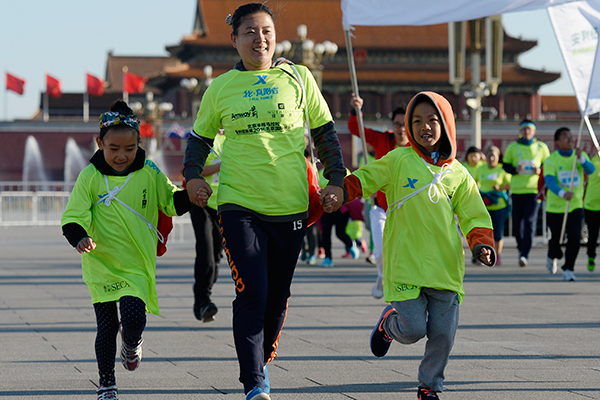Ongoing passion for fitness offers healthy returns to startups
By Huang Xiangyang (China Daily) Updated: 2016-05-05 07:37
 |
|
A mother and her two children join an international running festival in Beijing. The event attracted more than 20,000 participants. [Photo/China Daily] |
How much would you like to pay to cultivate a healthy habit that will keep you fit?
My personal trainer at the gym charged me 5,500 yuan ($850) for a 30-hour bodybuilding course, and when I tried to bargain, he cut me short, "Would you bargain with your doctors over medical costs if you fall ill?"
Though somewhat rude, he made a point: Health is invaluable, and it cannot be measured by money.
More and more people buy into the idea with their bulging wallets and rising health awareness, and a momentum is building up in the development of keep-fit business, creating wealth opportunities for those who see the potential.
Spending in health-related sectors in the United States reportedly makes up 15 percent of the country's gross domestic product, while the figure in China is only about 5 percent. That may partly explain why Alibaba Health, an offshoot of e-commerce giant Alibaba Group Holding Ltd, recently established a 1 billion yuan joint venture to make foray into internet health insurance in China.
Not just big companies are tapping the huge potential for health-related sectors in China. Some individuals with nothing but innovative ideas have also jumped on the bandwagon.
One successful example is an amateur runner with an online nickname Tiger, who came to Beijing several years ago after quitting his job in his hometown. He might not know Peter Lynch, but he definitely grasped the essence of US legendary investor's investment principle, "Invest in what you know".
It is running that he knows best.
I happened to learn of his story from an interview of him on China Central Television. He operates a program "100 people running for 100 days" through Tencent Holdings Ltd's social networking app WeChat, to help people build a running habit within 100 days, and of course, for himself to make money.
In less than two years, Tiger has turned his social networking group into a booming business, with the program's enrollment having increased by 16-fold from 100 people when it was first launched.
The idea of making money out of people's zeal for running interests me. To learn how his program works, I joined its latest, or the sixth edition lately, and now two weeks into it, I have been amazed.
The entry fee for the task-oriented program is 598 yuan, but you get a 200 yuan coupon to buy gear such as running shoes, socks and shirts from an online shop run by Tiger once you join. I used the coupon to buy a pair of leggings.
To accomplish the task you have to run at least three times a week for a minimum cumulative distance of 210 kilometers within 14 weeks. If you stick to the plan till the end, you get a refund of 200 yuan from e-hongbao, or red envelopes, offered by Tiger, and hopefully form a habit of running regularly that makes you capable of running a half marathon or an even longer distance.
Those who fail to accomplish the minimum task set at the start of each week will be kicked out of the social networking group-with no refund.
All this is made possible thanks to an internet age and widespread ownership of smartphones. A running app, Joyrun, enables members of the group to send and share data such as time, distance, pace, and rankings in the group. Team leaders are selected from members to monitor how well each one fulfills his task.
A sense of belonging, I believe, must be a major reason why so many choose to join the program. As a member of the program, running is no long a sport for lonely people.
The atmosphere in the online social networking group actually reminds me of a church, as we exchange our running experiences with missionary passion and read shared running guidelines like the Scriptures. Here we are all pious followers of the religion of running.
While everyone is happy, Tiger could potentially make at least 100,000 yuan each month from this latest edition of program, with basically no monetary investment.
Not bad for a startup entrepreneur.
- Service industry displays its capabilities at intl fair
- Govt plans platforms to bring manufacturing and internet together
- China, Italy hold forum to promote cooperation
- Uruguay debuts first Chinese-built electric bus
- Shanghai index tumbles on liquidity withdrawal
- Canton Fair data fuels export optimism
- VW China's environmental program big hit in Urumqi
- Beijing puts restriction on property buyers in Tongzhou district

















